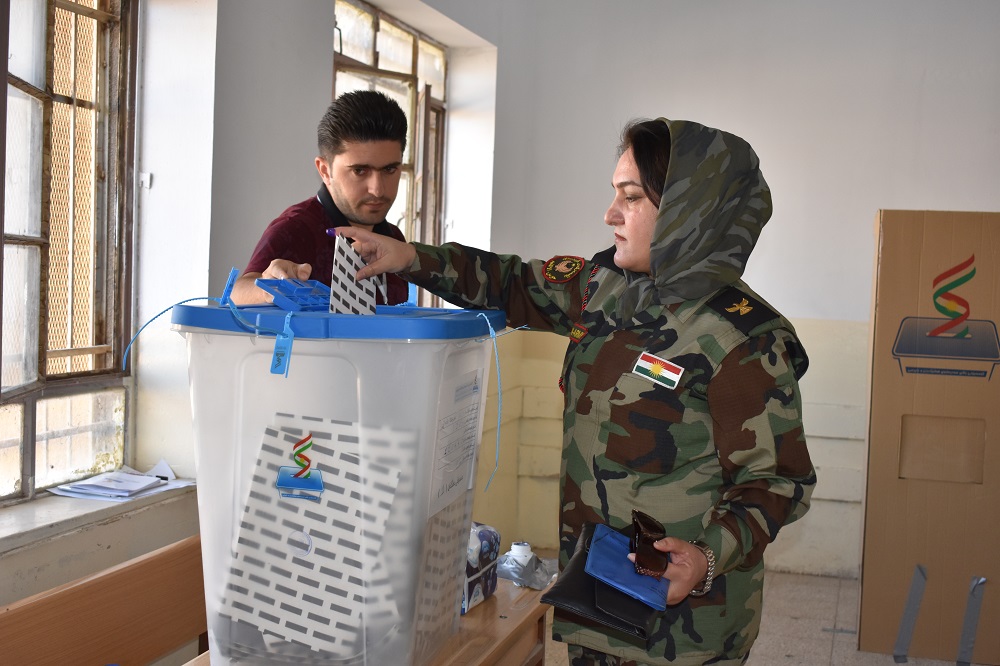Since the establishment of the semi-autonomous Kurdistan region in Iraq (KRI), no elections have been held on its legally set dates. The delays have ranged from two months to 10 years.
Currently, the Iraqi Kurdistan parliament has finished its fifth term and is planning to prolong it for another year in order have time for next General Elections which was due in October 2022.
The KRI, in the last 28 years, have held eight elections, five of them were regional parliamentary elections, two were provincial elections, and one was the presidential election.
KRI’s population, which is around six million people, based on the enacted law, has the right to participate in regional, provisional, and presidential elections every four years. This is besides the region's participations in the Iraqi federal elections since 2005.
Five Regional Parliamentary Elections
The first regional election took place in 1992, and based on the relevant law, back then, the parliament was called the National Council, whose term was supposed to last in three years but ended in 10 years.
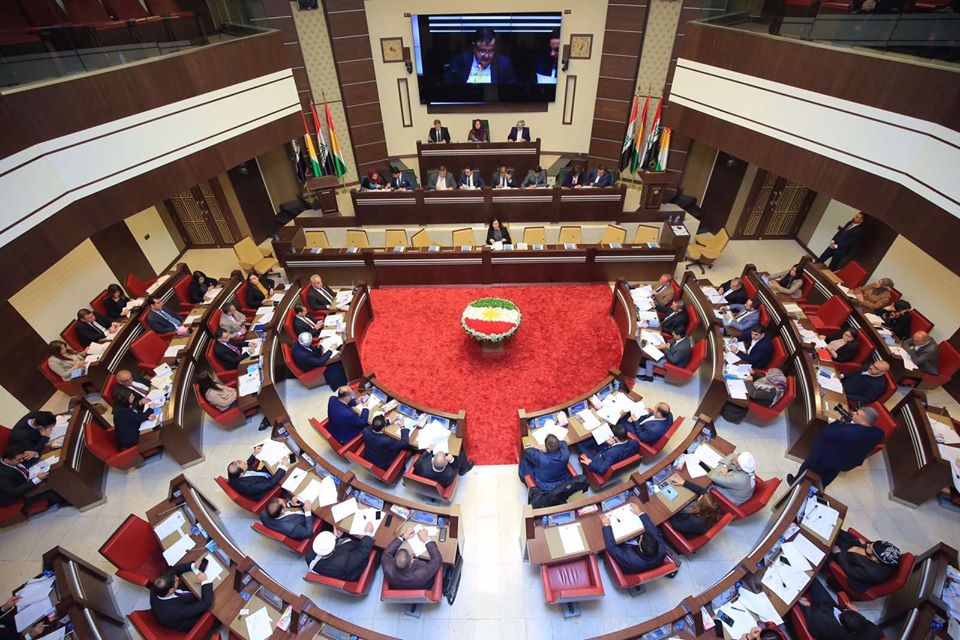
Erbil, a parliament session, 2020. Photo: Parliament Media
In 1995, the first term was legally supposed to end, but due to the Kurdistan Democratic Party (KDP) and the Patriotic Union of Kurdistan (PUK) civil war, the term continued until 1996.
Because of the war, KRI was divided over two administrations, KDP administration, and PUK administration. Also, no elections were held until 2005, when the second regional elections took place.
“One of the main reasons is a lack of a strong democratic system because in democratic countries elections are not postponed at all,” Hogr Chato, head of Shams Network for Election Observation.
Chato explained that the absence of a constitution is one of the reasons for the unstable dates of elections. As a result, the date of the elections is set according to the interest of the political parties, and this challenge will continue.”
Chato reaffirmed that the continuous delay of the elections would vanish people’s trust in the process to cause changes and delaying elections is about to become a phenomenon. “The problem is related to the foundations of the parties that we do not have democratic parties to hold elections on time.”
KRI held its third regional elections in July 2009, which was supposed to take place early in the same year. Likewise, the 2013 parliamentary elections that happened in September were also postponed for two months.
Later in 2015, the KRI parliament was shut down for nearly two years as KDP blocked Yusuf Mohammed, parliament speaker, from entering Erbil, where parliament is located. Mohammed belonged to the Gorran Movement, whose relations with KDP significantly deteriorated at the time.
The last KRI’s regional elections took place in September 2018, which should have been held a year earlier in 2017.
“Elections are the only factor for changes in all countries… but in Kurdistan, the two ruling parties hold the elections at a date that favors their interest… they have left no values for elections,” said Rayan Akram.
Akram lives in Sulaimaniyah and is concerned that the elections will again get delayed because “they are not ready to hold the provincial elections and they close the door of parliament whenever they want.”
Two provincial elections in 15 years
The first nationwide Iraqi provincial election was held in 2005 that also included the Kurdistan Region. The term was meant to end in 2009, but it was extended until April 2014 in the KRI.
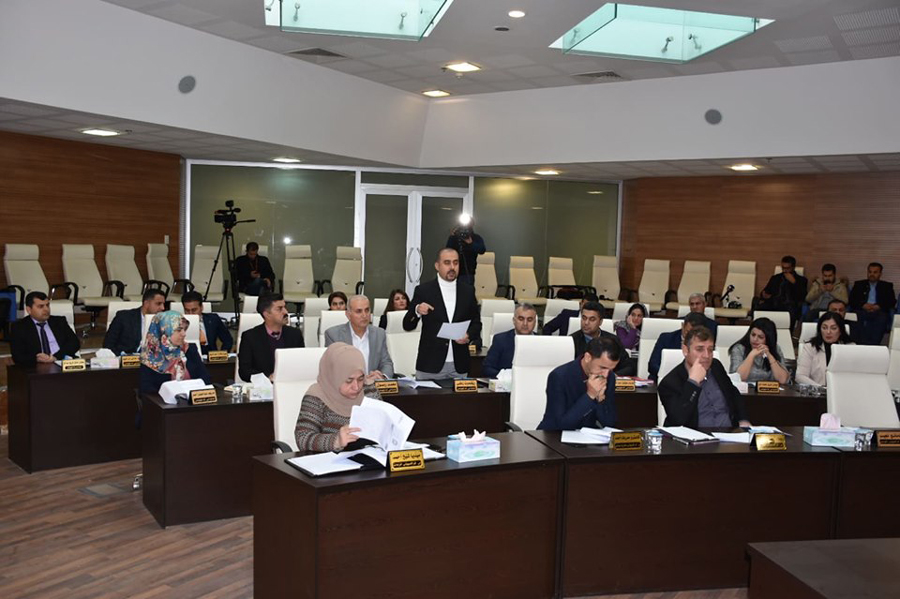
Sulaimaniyah, a session of the provincial council, 2019. Photo: the council’s media
However, another provincial election in the region did not happen after four years in 2018, and the term, based on the provincial electoral amendment, has been extended to the next election, which lacks a date.
Vyan Haider, head of Tamuz Organization for Election Observation, thinks that the important point is that the process has been held even though there were legal violations, for instance, in the provincial elections.
“partisan interest has been the barrier to provincial elections. The continuity of this situation is because of the absence of the Federal Supreme Court in the KRI, and at the same time, there is no strong opposition to insist on holding the elections,” Haider stated.
She also reaffirmed that they have more than time asked for adhering to the legal dates.
Unlike KRI, the provincial elections are held every four years in other Iraqi provinces except for Kirkuk.
“Elections have become like the prediction of weather. Whenever elections favor the authorities, they hold it. And whenever elections do not favor them, they delay it through amending electoral law,” Zheer Ahmad stated.
Ahmad is a university graduate and lives in Erbil. He sees election as a public celebration and nothing else “because most of the people’s votes are determined before the elections, and there is no academic institution to analyze the degree to which the parties deliver their promises.”
Presidency between people and parliament
The first presidential election took place in 1992 in the Kurdistan Region: however, the results were not implemented. No president was elected for the region until 2005 when KRI presidency was formed, and Masoud Barzani became the first president of the KRI, who was elected in the parliament.
Barzani was elected again by the direct votes of people in the 2009 presidential election.
In June 2013, Barzani’s presidential term was extended to another two years, which was strongly opposed by the protests parties, including the Gorran movement. Likewise, the closure of parliament in 2015 also paved the way for Barzani to remain in office until 2017 when he resigned. In 2018, parliament suspended the KRI presidency.
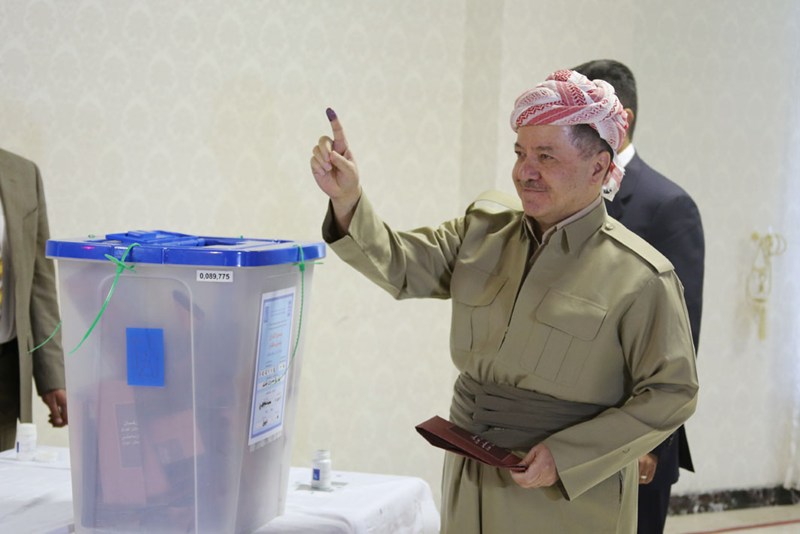
Erbil, Masoud Barzani is casting his vote in the regional elections, 2013. Photo: KRI presidency
Aram Jamal, executive director of the Kurdish Institute for Election (KIE), sees political parties interference in the election as the main factor for not holding elections on their legal dates.
“If a political party knows that it cannot secure significant votes, it will try to delay the election through the government and the presidency.”
KIE had proposed a project to the Kurdistan Region’s parliament to pass a resolution that would set dates for regional, presidential, and provincial election, like other countries, aiming at avoiding elections delays, which has caused much disagreement among the political parties as well as people.
The project was not implemented, and Jamal became disappointed. “They do not do that here because they know if fixed dates are set elections, then it will not be easy to them to delay them,” Jamal pointing at KDP and PUK, the two ruling parties.
After KDP’s negotiations with the Kurdish parties in 2019, the KRI presidency was once more reinstituted by the parliament, and Nichervan Barzani was elected president of the region inside the parliament.
Jamal explained that if elections are held on time, then authorities will lose legitimacy because legitimacy has a start and an end, too. “People will lose hope in their representatives.”
The challenge to set dates for elections in the Kurdistan Region
The challenge to set dates for the different elections in the Kurdistan Region has been connected with the absence of a regional constitution. The region has proposed a draft of the constitution. However, the political parties are yet to resolve their disputes on it in .order to finalize it
Rozhan Ibrahim, a member of the Legal Affairs Committee in the KRI parliament, met with the Independent High Elections and Referendum Commission (KHEC) and explained numerous proposals, “including passing a particular law to set dates for the Kurdistan Region’s elections.”
“We all prefer that the elections are held on their legal dates, but the situation in the Kurdistan Region and the other part of Iraq with different ethnic components have had effects, it has even influenced the electorate who do not vote significantly,” stated Ibrahim.
She also thinks that the emergence of the Islamic State group (IS), the security situation, and the other developments have had their effects on the elections.
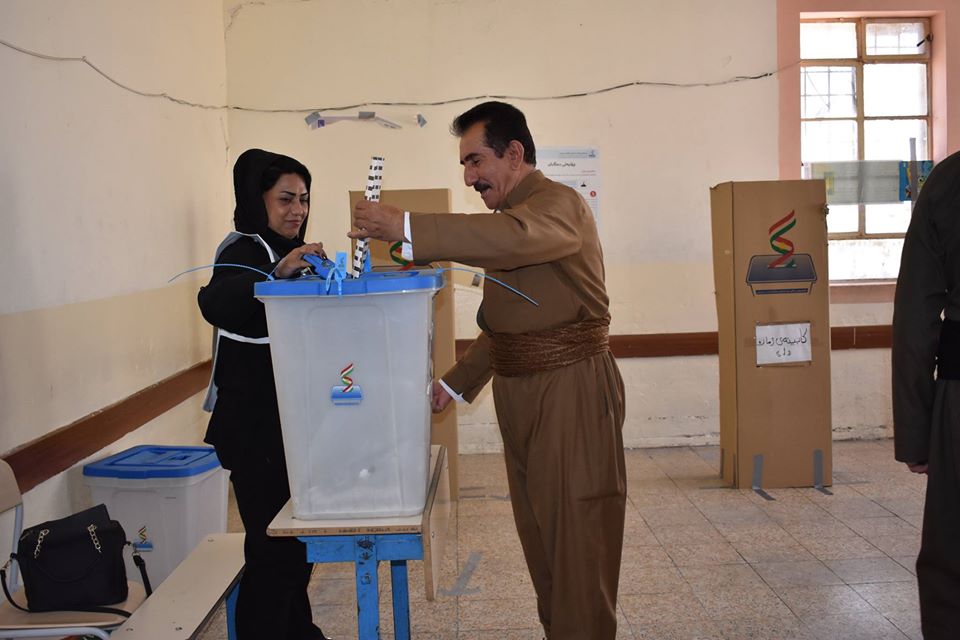
Kurdistan Region, 2018 regional election. Photo: KHEC
KHEC organizes election process in the region-except for Iraqi Federal Elections- and needs six months before the election dates to prepare the process adequately.
Sherwan Zrar, the spokesperson of KHEC, states that setting fixed dates for the elections is within the authority of the parliament. If the dates are set, then it will not allow negotiations or argumentations, it will facilitate the preparations.
“When you know the date of the elections a year prior, then you can organize the elections in advance and work on reorganizing electorate lists.”
Zrar stated that they had submitted a proposal to the parliament to set dates for elections, including regional and provincial elections.
The delay in the elections in the KRI has passed these three institutions, since it is common in the majority of trade unions, associations, party congresses, organizations and even the Miss Kurdistan election, without any practical steps to put an end to this phenomenon.
A bill signed by 85 Kurdish lawmakers MPs has passed its first and second review in the Regional Parliament this week (October 2022). This will postpone the general elections in the Kurdistan Region for another time.

